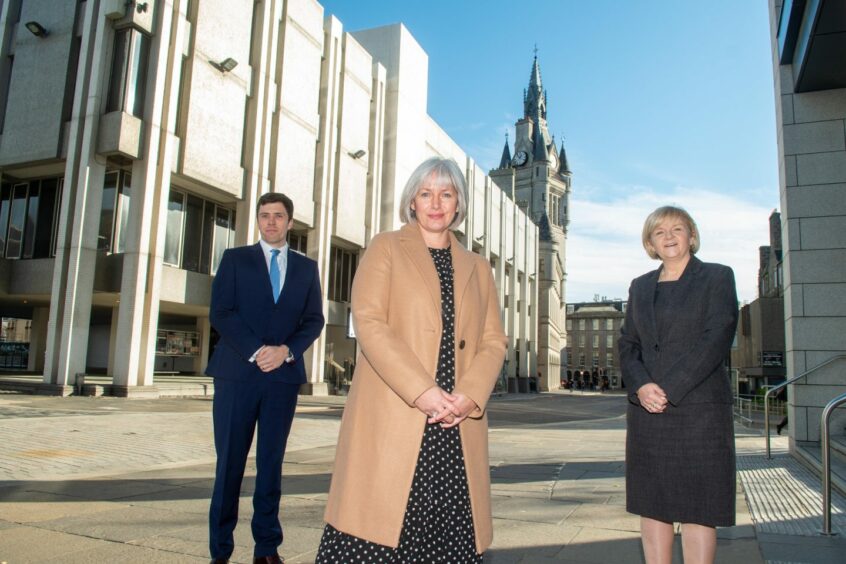 © Supplied by Aberdeen City Counci
© Supplied by Aberdeen City Counci Energy giant BP has won approval to become a joint venture partner of Aberdeen City Council (ACC) to build Scotland’s first “scalable” green hydrogen production plant.
It is hoped the project will put the Granite City at the heart of a new export industry, helping to unlock new economic opportunities worth upwards of £700 million to Scotland’s economy by 2030.
It is also expected to lead to thousands of high-value jobs in Aberdeen and the surrounding region.
A site has not yet been identified for the hydrogen “hub”, which is expected to cost £215m to set up and run over 10 years.
BP was unveiled as the council’s preferred partner last October.
ACC’s city growth and resources committee has now rubber-stamped the tie-up.
It follows a clash between the Scottish Greens and Tories over BP’s involvement.
North-east Green MSP Maggie Chapman raised her “concern” at Holyrood over the partnership, following reports BP paid a private firm to track climate activists.
Ms Chapman claimed BP was responsible for “huge environmental damage across the planet”, saying its treatment of workers around the world had been “questionable”.
But the Scottish Conservatives accused the Greens for “trying to derail” the hydrogen hub project.
‘Transformative step’
Following today’s official approval for BP, ACC leader Jenny Laing said the investment in clean energy would be a transformative step for Aberdeen on its route to net-zero.
She added: “This is a huge announcement for Aberdeen.
“It supports the delivery of our net-zero vision and paves the way for the city to be a world leader in the production of hydrogen-based green fuel and energy.
“It will help create a cleaner, more sustainable city for local people and it also provides us with the opportunity to create hundreds of skilled jobs and add millions to the Aberdeen economy.”
Councillor Laing continued: “Aberdeen has a worldwide reputation as a pioneering hydrogen city.
“By working in partnership with BP we intend to put Aberdeen at the forefront of the green economic recovery.”
Louise Kingham, UK head of country and senior vice-president for Europe, BP, said the energy firm’s involvement was part of its commitment to “providing integrated energy solutions to help cities and corporations decarbonise.
Ms Kingham added: “This hydrogen hub proposal can help do just that.
“We look forward to working with the local authority to deliver this…, drawing on the skills and expertise of our people and their vast experience delivering complex energy projects.”
The proposed Aberdeen Hydrogen Hub (AHH) is another feather in the cap for the Granite City as the world grapples with new technologies to replace fossil fuels.
More than two million passengers have already travelled on the city’s eco-friendly hydrogen buses since they were introduced in 2015.
It is estimated the CO2 savings to date are in excess of 100 tonnes.
The world’s first hydrogen-power double decker buses made their debut on the city’s road network just over a year ago.
City growth and resources committee convener Ryan Houghton said: “I am incredibly proud of this next step Aberdeen is making with our commercial partner BP, which has advised the council on the delivery of our energy transition strategic infrastructure plan and this exciting announcement builds on that work.
“We’re proud that hydrogen is already here in Aberdeen and this significant commercial partnership with BP is set to support our ambitions.”
Councillor Houghton added: “We plan to create a blueprint which can be replicated around the world by the cities and regions looking to reach net-zero.
“Aberdeen’s position as a leader in the energy industry requires ongoing investment and partnership – and the hydrogen hub is a fantastic example.”
Catalyst for growing hydrogen take-up
A report to committee members today said managing hydrogen demand across fleets and increasing production of the gas, while co-ordinating supplies and training could lower the cost of the gas.
It would also act as a catalyst for growing hydrogen fuel take-up within growth sectors of the local economy, the report said.
It added: “This would then create significant economic opportunities as part of an energy transition in the city and shire region.”
How will the hydrogen ‘hub’ take shape?
It is envisaged the AHH will be developed in three phases in response to growing demand for hydrogen.
- Initial production for public sector consumption, including the provision of a “resilient, cost-effective supply of hydrogen on a commercial basis to the market to support both existing and proposed transport projects”.
- Expansion in the short to medium term to connect to “larger volume utilisation of hydrogen – rail, trucks and marine use”.
- Hydrogen for heat and export as part of a “whole-system approach to supply and demand”, with an innovation, skills and transition “hub” supporting expansion of the local supply chain.
